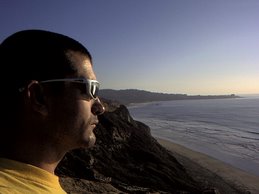Monday, November 26, 2007
Ask VBPL... Maybe I'll Answer
I am approaching this from the perspective of a convert to the way IM can be used for reference services... I love our new IM reference service (Ask VBPL), and really have enjoyed using it from both sides of the interface. The evidence overwhelmingly suggests that IM and text messaging are the preferred tools of younger Americans, and we can infer, younger library users. For this reason alone it would be irresponsible on our part to ignore the possibilities this communication format offers. But it is not only tweens, teens, and twenty-somethings that are making use of the connection to library services through IM. Though we don't ask for a birth certificate when conducting IM transactions, I am positive that I have helped several people that are older than what we might stereotypically think a user of IM would be. I think that many adults are making use of this technology and are finding it to be a useful way to connect to the library as well. While we are only just beginning to tap the possibilities that IM services can make available to us and our customers, I think we are heading in the right direction by getting our feet wet now. Additionally, while the technology will almost certainly change and evolve as time goes by, I think that we will be well served (as will our customers) to keep up with those changes and look for new ways to take advantage of them.
I'm into IM
Before I began my graduate studies, I was ambivalent about IM and its uses. Since then, I have come to appreciate the spontaneity that IM affords users, allowing them to communicate thoughts and ideas in a much more interactive manner than is possible with email. I have had many opportunities to text chat and IM with classmates and friends who are hundreds of miles away, and I have to say that this technology has made cooperative, synchronous learning not only possible but exciting as well. The ability for several participants to bounce ideas off one another in real time can greatly enhance cohesiveness and productivity. On the other hand, because the technology is so ubiquitous, it can sometimes be a distraction to accomplishing other work. Like all technology, it is definitely important to balance your immersion in IM with other work, and means of socialization. Done correctly, IM is one of the most productive ways to communicate thoughts and ideas quickly and collaboratively. It is exciting to think of ways in which libraries can begin to more fully utilize that potential in our everyday work.
Labels:
IM,
instant messaging,
learning 2.0,
libraries,
library 2.0,
lifelong learning,
text chat
Sunday, November 18, 2007
Locating Feeds
After trying several of the feed search tools that we were given to explore, I have to say that I still like finding my feeds the "old fashioned" way... use my list of frequently visited sites and paste their URL into the add subscription box. In this way, I am able to be fairly certain about the type of content I will receive without getting bogged down in content I don't really want. On the other side of that coin, I am restricted to those sites that I am already aware of and that have RSS feeds built in. Searching with the tools mentioned in this exercise could help me to expand upon that list if I needed, so I can see the benefit. For now, I have plenty of content to keep me busy, and am finding new sites on my own all the time.
RSS
I have to admit that I am slowly coming around to RSS... honestly, I sometimes feel like there is just too much to keep up with already through my normal news delivery channels. However, after listening to several of the presentations on the benefits of RSS I have decided to give it a shot. What I do like is that I am in control of the channels and therefore the type of content that I receive. In essence, RSS works like a funnel to bring all the news sources that I find useful and informative together in one location. Subscribing to new feeds is easy, as was signing up for the Google Reader account since I already had a Google ID established from my blog.
On the other hand, that same ease of adding new feeds could potentially dilute the benefits of the service. It only took me a few minutes to add a dozen or so interesting feeds, and I doubt that it would take much more time to build my subscription list even further, but having more feeds also means that I would need to spend more time reviewing the content delivered by each. Luckily it is also easy to unsubscribe, but balancing the right number of feeds for each person is something that deserves consideration.
On the other hand, that same ease of adding new feeds could potentially dilute the benefits of the service. It only took me a few minutes to add a dozen or so interesting feeds, and I doubt that it would take much more time to build my subscription list even further, but having more feeds also means that I would need to spend more time reviewing the content delivered by each. Luckily it is also easy to unsubscribe, but balancing the right number of feeds for each person is something that deserves consideration.
Thursday, November 15, 2007
Learning 2.0 and Libraries
I think it is fascinating to think about all of the interesting new tools and applications available online at this point and time, and even more so to contemplate the directions those new technologies may go in the future. I am also intrigued by the seemingly endless possibilities that these new functionalities open up for those of us in the information profession. The idea that we as librarians are uniquely positioned to be at the forefront of the development and utilization of these tools is exiting as well.
Of course, this also means that we will constantly be reevaluating the direction of our services, but I agree that it does not mean that we need to change our fundamental values or mission. Yes, we may not need to have the "just in case collections" described by Rick Anderson, but I don't know that we have to resign ourselves to precipitous drops in circulation just yet either. Even if things like that do come to pass, I believe that we only need to be more flexible in determining how we define and measure success. We also need to be constantly aware that our journey may not have a final destination, and we should commit ourselves to the idea of being the most knowledgeable travelers we can be.
Of course, this also means that we will constantly be reevaluating the direction of our services, but I agree that it does not mean that we need to change our fundamental values or mission. Yes, we may not need to have the "just in case collections" described by Rick Anderson, but I don't know that we have to resign ourselves to precipitous drops in circulation just yet either. Even if things like that do come to pass, I believe that we only need to be more flexible in determining how we define and measure success. We also need to be constantly aware that our journey may not have a final destination, and we should commit ourselves to the idea of being the most knowledgeable travelers we can be.
Lifelong Learning Habits
The lifelong learning video really reaffirmed my natural inclination towards lifelong learning. Whether I am consciously pursuing knowledge for its own sake, or simply being curious, I am most at home when learning new things. Sometimes this takes the form of concentrated study, sometimes it is a much more casual process. In either case, the easiest and hardest of the 7 and 1/2 habits seem to remain more or less the same for me:
Easiest to overcome- View problems as challenges... this is never an issue for me, since the problem is often the thing that spurs my desire to learn something. If I have trouble with a concept or tool, leaving quantum physics aside, I go out of my way to find out more about what causes the problem and how I can overcome it.
Hardest to overcome- Begin with the end in mind... In some cases this is not so much of an issue, but in others it can bog me down in my learning process. If I am clear about my end goal, I usually have no problem following through with the steps that will carry me there. However, many times I seek knowledge with little idea of what it goal it will ultimately help me achieve. I don't believe that learning for its own sake is necessarily a bad thing, but it can lead to a head full of arcane knowledge with no useful outlet.
Easiest to overcome- View problems as challenges... this is never an issue for me, since the problem is often the thing that spurs my desire to learn something. If I have trouble with a concept or tool, leaving quantum physics aside, I go out of my way to find out more about what causes the problem and how I can overcome it.
Hardest to overcome- Begin with the end in mind... In some cases this is not so much of an issue, but in others it can bog me down in my learning process. If I am clear about my end goal, I usually have no problem following through with the steps that will carry me there. However, many times I seek knowledge with little idea of what it goal it will ultimately help me achieve. I don't believe that learning for its own sake is necessarily a bad thing, but it can lead to a head full of arcane knowledge with no useful outlet.
Labels:
habits,
learning 2.0,
library 2.0,
lifelong learning
Subscribe to:
Comments (Atom)


